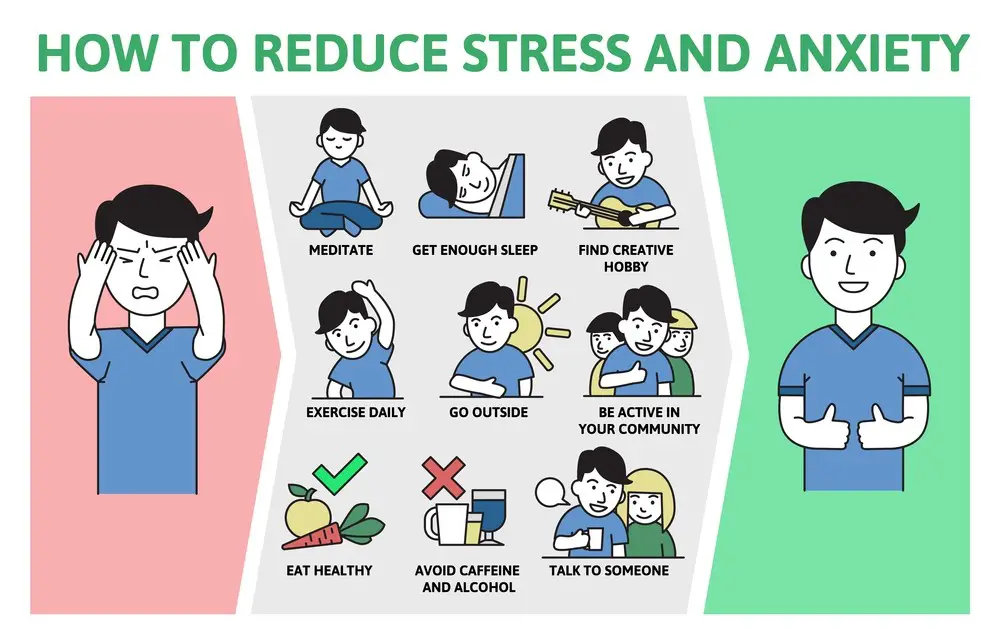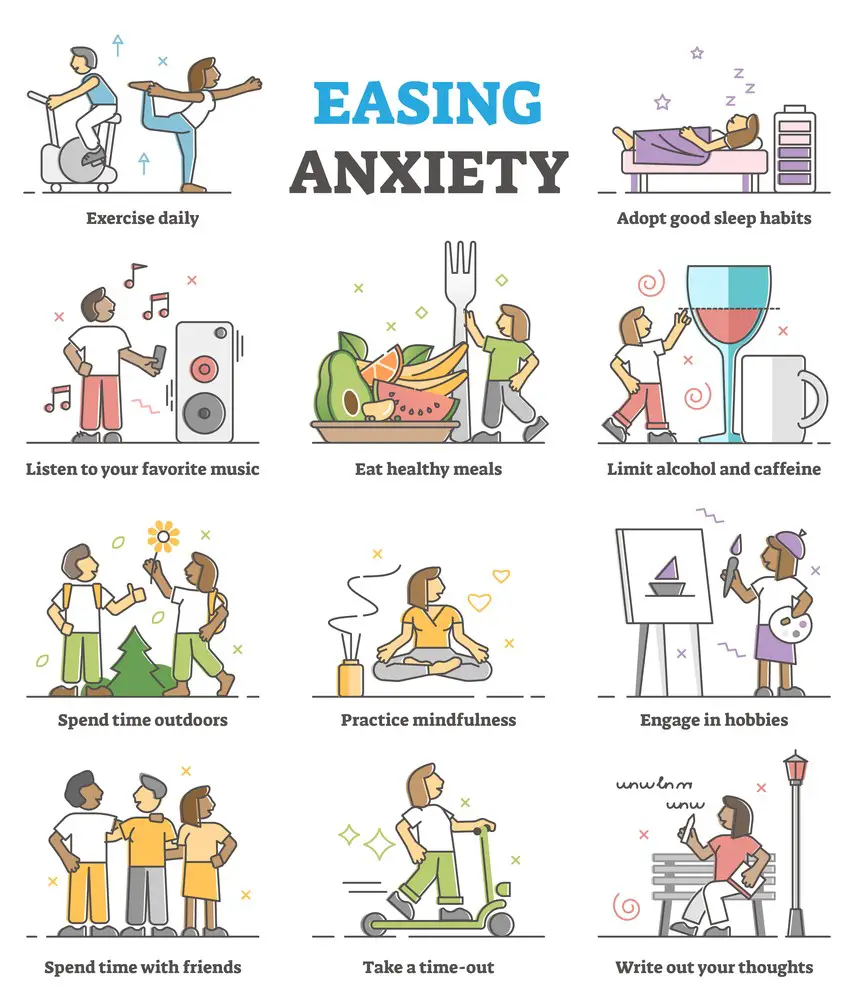As a BetterHelp affiliate, we receive compensation from BetterHelp if you purchase products or services through the links provided
Navigating the fine line between stress and an anxiety disorder can be tricky. To clear up the fog, we’ve turned to the wisdom of experts—a seasoned psychologist and a knowledgeable registered nurse. Together, they break down this complex topic into four key areas you’ll want to pay attention to: Understanding Triggers and Duration, Recognizing Chronic Issues vs. Acute, Distinguishing Stress from Irrational Fear, and Assessing Symptom Persistence and Intensity. Whether pinpointing how long symptoms last or differentiating everyday stress from irrational fears, these guidelines help you understand your emotional landscape.
 1. Understand Triggers and Duration
1. Understand Triggers and Duration
One clear distinction I’ve observed lies in their triggers and duration. Stress typically has a direct, identifiable cause; it’s a normal response to our struggles and tends to disappear once the issue is resolved.
On the other hand, an anxiety disorder often lingers, can be triggered at any time, and sometimes even without a clear cause. It’s like a shadow that follows you, overwhelming everyday situations.
In both cases, my best tip lies in self-awareness. Individuals need to become more connected with their emotions and triggers, recognize any disproportionate reactions, and apply coping strategies to help mitigate the intensity of their anxiety and, if possible, resolve the specific issues.
Bayu Prihandito, Certified Psychology Expert, Life Coach, Founder, Life Architekture
2. Recognize Chronic Issues vs. Acute
The difference is most similar to the difference between acute stress and chronic stress. Acute stress is like when you are late to work or have a deadline to meet. Chronic stress is like when your in-laws move in with you.
An anxiety disorder is chronic. When working with clients, I often say anxiety can be good. It’s like cooking with gas. On low, it can help us make needed changes in life. On high constantly, it burns things and ultimately burns us out. Finding tools to understand, manage, and regulate anxiety is essential.
William Schroeder, Co-Owner, Just Mind
3. Distinguish Stress from Irrational Fear
Stress, in and of itself, is neither good nor bad. Stress is what gets us out of bed every morning. It causes us to challenge ourselves. The way we deal with stress can be either beneficial or detrimental.
A phobia or anxiety disorder is different. It is an irrational fear that is difficult or impossible for the sufferer to control. This irrational fear may cause the sufferer to avoid day-to-day—even pleasurable—activities.
Think of stress like the air in a tire. If you have too little air in a tire, you’ll get poor gas mileage, and the car will drive shakily. If you have too much air in the tire, you run the risk of a blowout. The goal is to put enough stress in your life to keep growing and improving, but not so much that it affects your health.
If stress is causing you to miss out on pleasurable things or causing health problems, you may want to ask an expert for help.
Doug Staneart, CEO, Fearless Presentations
4. Assess Symptom Persistence and Intensity
Stress and anxiety are related but distinct experiences. One factor that can help people differentiate between the two is the persistence and intensity of their symptoms. Stress is typically a response to a specific external trigger, such as work deadlines or relationship problems. It often subsides once the stressor is removed or resolved. On the other hand, an anxiety disorder involves excessive worry and fear that can persist even without an obvious stressor.
A helpful tip for identifying whether you might be struggling with an anxiety disorder is to consider the duration and impact of your symptoms. It could indicate an anxiety disorder if you constantly worry about experiencing physical symptoms like a racing heart or muscle tension, which significantly interfere with your daily life. Consulting a mental health professional for a proper evaluation is advisable in such cases.
Rhianna Jones, Registered Nurse, CanXida

5 Actionable Tips to Manage Stress and Anxiety
Let’s bring all that expert advice down to earth with some actionable tips you can use today.
- Identify Triggers: Jot down what specifically sparks your stress or anxiety. Awareness is the first step toward management.
- Set Boundaries: If work stress is overwhelming, consider setting boundaries like turning off email notifications after a certain time.
- Practice Mindfulness: Techniques such as deep breathing and grounding exercises can help you become more aware of the present, pushing away anxiety and stress.
- Reality-Check Your Worries: When anxiety looms, ask yourself how realistic your worries are. Challenge irrational fears with facts.
- Seek Support: Don’t underestimate the power of a good support system, whether friends, family, or support groups.
 Therapy 101: When and How to Seek Professional Help
Therapy 101: When and How to Seek Professional Help
Signs You Need Therapy
Sometimes, stress and anxiety can overwhelm us where expert intervention is needed. Signs you may need therapy include:
- Persistent feelings of sadness or hopelessness
- Excessive fears and worries that impede daily activities
- Difficulty concentrating or indecisiveness
- Sudden changes in eating and sleeping habits
Setting Goals for Therapy
Venturing into therapy can be overwhelming. Goals can give you direction. Here’s how to set them:
- Start with broad goals like, “I want to feel happier,” then break them down into smaller, measurable objectives.
- Make goals specific. Instead of “I want to stress less,” try “I will spend 10 minutes daily doing breathing exercises.”
Recognizing Progress in Therapy
You’re investing time and emotions in therapy; wanting to see progress is natural. Here’s how to gauge it:
- Track your feelings and thoughts over time in a dedicated therapy journal.
- Celebrate small victories. Did you manage your stress better at work this week? That’s progress!
- Consult with your therapist regularly about your progress and any adjustments that need to be made to your treatment plan.
By integrating these tips and being mindful of when to seek professional help, you’ll be well-equipped to manage stress and anxiety effectively.
About Jacob Maslow
After surviving the traumatizing events of 9/11, I took it upon myself to heal through helping others. I’m the primary caregiver of my children and understand from first-hand experience the lonely paths you have to walk as a partner and parent when leaving an unhealthy relationship.
We’re all echoing in a dark space that doesn’t have to be this empty, and that’s been my mission since finding solace and recovery in therapy: To help comfort others who are still in shock and at the prime of their struggle.
I came across BetterHelp after searching for this type of community. I wanted to belong to a body of proactive therapists and supportive therapy veterans that allowed me to see other sides of the story.
It was unconventional, and that’s what attracted me most. During my most challenging times, when my ex-wife completely cut me off from my children, I found comfort and clarity through BetterHelp.
Instead of being chained to a strict therapist recommendation, I was in charge of who I felt understood my struggle most. That allowed me to find my true peace, as I was reunited with those who read behind my words and had first-hand experience with my trauma.
Recovery is a choice; with BetterHelp, that choice will be a few clicks away. You can join their couples-oriented platform, Regain.us, for those stuck with family estrangement and toxic relationship patterns.
- 7 Ideas to Help You Relax and Unwind on a Family Vacation - April 27, 2025
- How Having Cybersecurity Protection Helps You Relax - April 25, 2025
- 8 Reasons Why Spending Time Outside Calms You Down - April 25, 2025
This site contains affiliate links to products. We will receive a commission for purchases made through these links.

 1. Understand Triggers and Duration
1. Understand Triggers and Duration Therapy 101: When and How to Seek Professional Help
Therapy 101: When and How to Seek Professional Help
